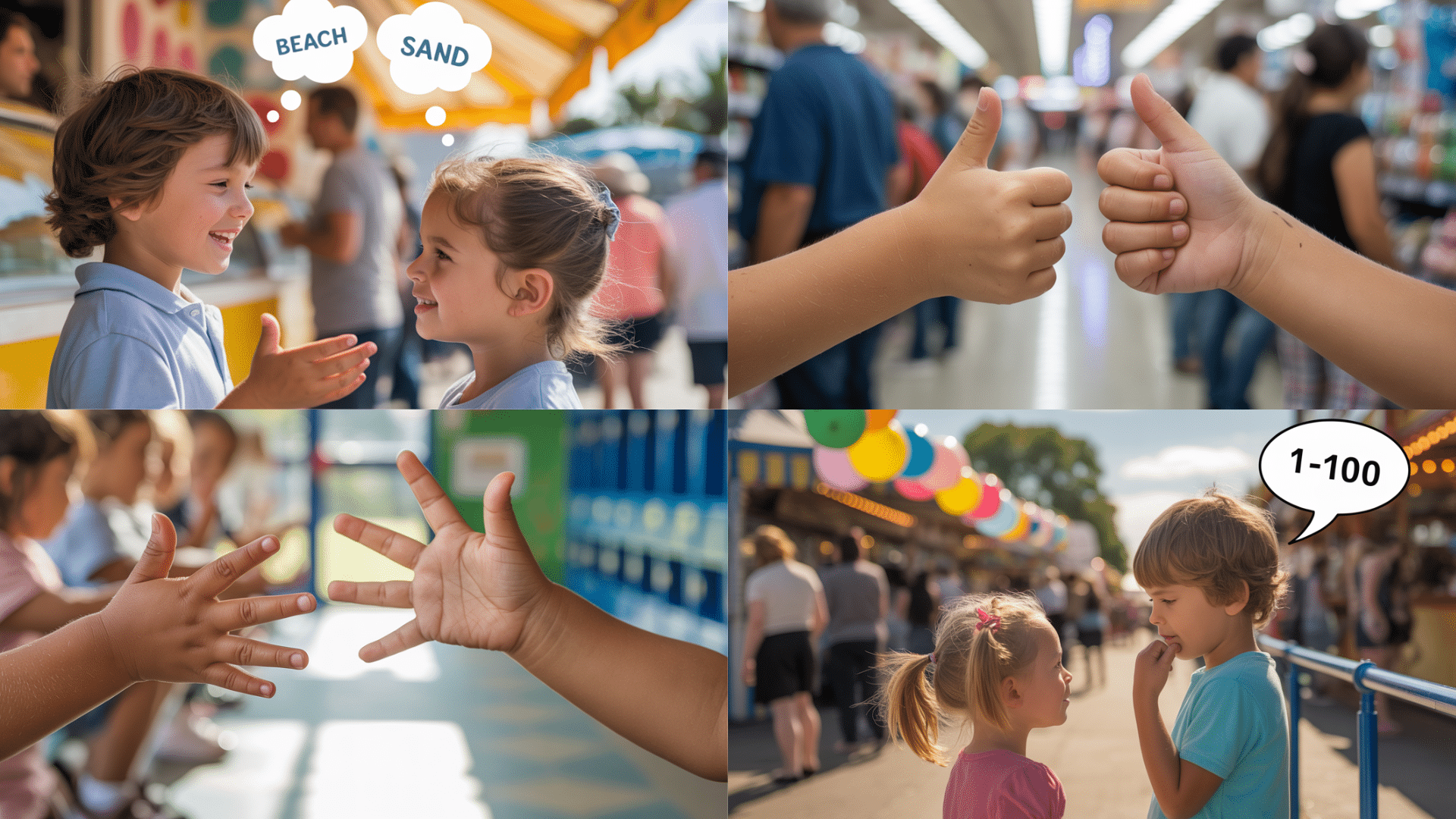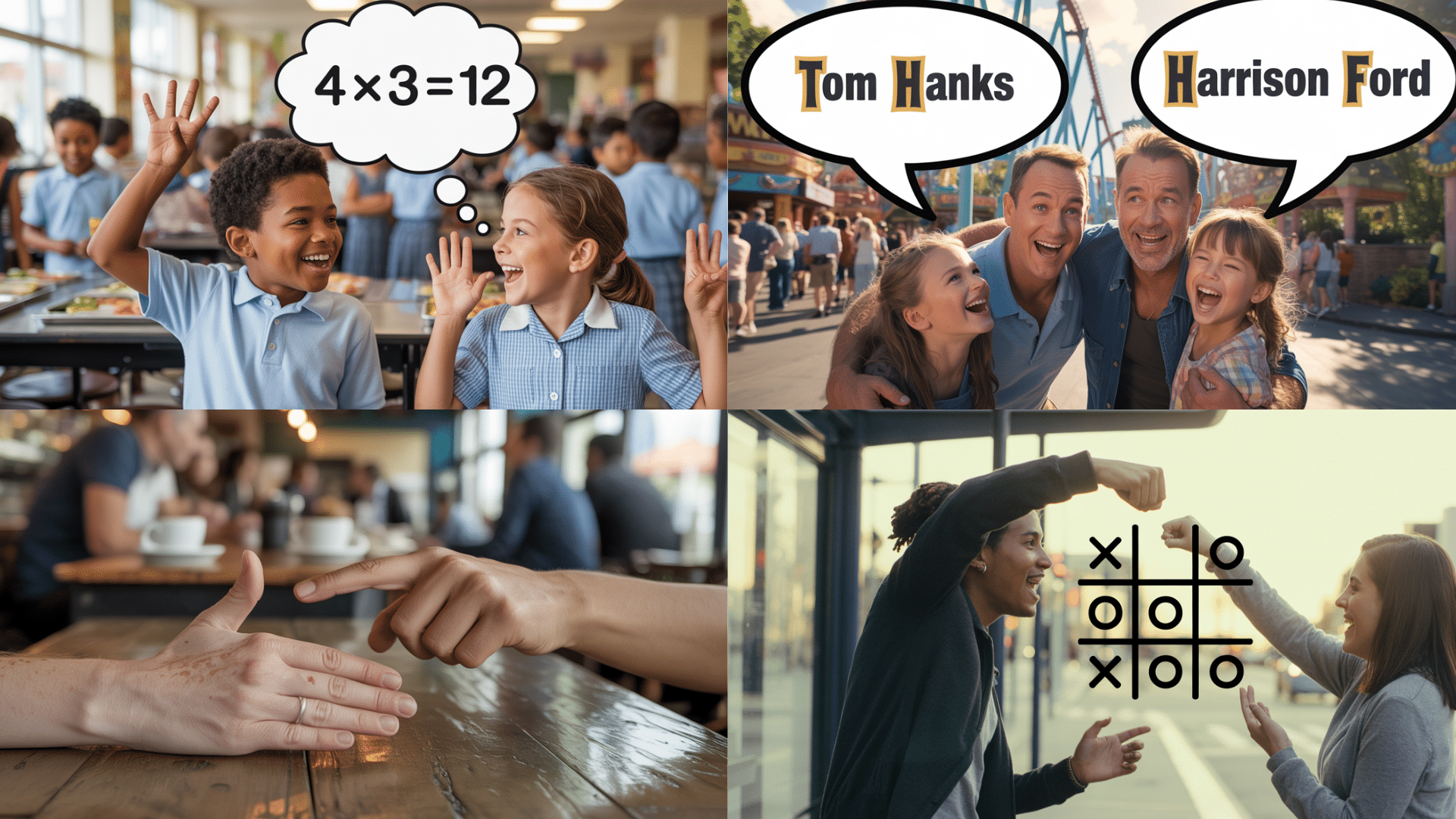Standing in line is no fun. Minutes feel like hours when you’re stuck waiting at the grocery store, DMV, or theme park. The phone scroll gets old fast, and staring at walls isn’t much better.
But what if waiting time could be play time? Small, simple games can turn dull moments into fun ones. No fancy equipment needed – just your brain, maybe your hands, or your phone.
Games to play while waiting in line can make time zip by. They can keep kids happy, adults entertained, and even create little moments of joy in otherwise wasted minutes.
Ready to make your next wait more enjoyable? Let’s look at some easy, quick games that fit perfectly into those boring line moments!
Why Playing Games Can Make Waiting in Line More Fun?

Turning waiting time into gaming time can completely change how you feel about standing in line. Here’s why games work so well:
- Brain engagement: When you play games, your mind focuses on the activity instead of the wait time, making minutes pass faster.
- Stress reduction: Games create a fun distraction that lowers frustration and anxiety, often felt when stuck in long lines.
- Social connection: Many games to play while waiting in line can include others around you, turning strangers into temporary playmates.
- Skill building: Simple games can sharpen memory, problem-solving, or word skills while you wait, making the time useful.
- Mood booster: Playing even small games triggers happy chemicals in your brain, improving your outlook and patience during the wait.
Next time you’re stuck in a line, try a game instead of sighing at your watch – you might find the wait becomes the best part of your day.
Line Waiting Made Fun: The Best Games to Play

Looking for ways to make waiting more bearable? Here’s a collection of games to play while waiting in line that require minimal setup and maximum fun:
1. Twenty Questions
This classic guessing game works perfectly in line. One person thinks of an object, animal, or person. Others ask yes-or-no questions to figure it out. The goal is to guess correctly within twenty questions or fewer.
- What you’ll need: Just your imagination and people to play with.
- How to play: One player thinks of something, others ask yes/no questions to guess it within 20 tries.
2. Word Association
A quick-thinking word game where each player responds with a related word. Say “beach,” and the next person might say “sand.” Continue the chain with each new word connecting to the previous one.
- What you’ll need: No materials required.
- How to play: First player says a word, next player responds with a related word, and so on.
3. I Spy
Perfect for visual areas, one player chooses something visible and says, “I spy with my little eye, something beginning with…” Others guess what the object is based on the first letter or other clues.
- What you’ll need: Visual surroundings with various objects.
- How to play: One person spots an object and gives a clue, others guess what it is.
4. Rock, Paper, Scissors Tournament
Turn a simple hand game into a mini-tournament. Winners continue playing against each other until one champion remains. You can add fun stakes like who gets to choose lunch.
- What you’ll need: Just your hands.
- How to play: Make hand gestures (rock, paper, or scissors) on the count of three; track winners through rounds.
5. The Alphabet Game
Find items around you that start with each letter of the alphabet, working from A to Z. In a store? “A” could be “apples” in someone’s cart, “B” for “basket,” and so on.
- What you’ll need: Observable surroundings.
- How to play: Spot items beginning with each letter of the alphabet in sequence.
6. Categories
Choose a category like “animals” or “movies.” Take turns naming items that fit. No repeats allowed! Last person who can think of a unique item wins that round.
- What you’ll need: General knowledge.
- How to play: Pick a theme, then take turns naming items within that category without repeating.
7. Thumb Wrestling
A classic hand game that’s perfect for two players. Hook thumbs and try to pin your opponent’s thumb down while avoiding getting pinned yourself. Best out of three wins!
- What you’ll need: Two hands.
- How to play: Join hands, thumbs up, count “1-2-3-4, I declare thumb war” before trying to pin the opponent’s thumb.
8. Word Squares
Challenge each other to create a 4×4 square where words read the same across and down. Start with a common four-letter word and build from there. Trickier than it sounds!
- What you’ll need: Paper and pen (or mental visualization).
- How to play: Create a word square where the same words read horizontally and vertically.
9. Contact
One player thinks of a word and reveals its first letter. Others try to guess words starting with that letter. The first player adds letters if the guesses get close to their word.
- What you’ll need: Vocabulary knowledge.
- How to play: Guess words based on revealed letters while one player holds a secret word.
10. Paper Football
Fold a piece of paper into a triangle to create a “football.” Take turns flicking it across a flat surface, scoring when it hangs over the edge without falling off.
- What you’ll need: Paper and flat surface like a book or clipboard.
- How to play: Flick folded paper triangle to score points when it hangs partially off the edge.
11. The Memory Game
First player says, “I’m going shopping and I’m buying…” naming an item. Next player repeats and adds an item. Each player must recall the growing list in order.
- What you’ll need: Good memory.
- How to play: Recite a growing list of items in exact order, adding one new item each turn.
12. Word Chain
One player says a word, and the next must say a word that begins with the last letter of the previous word. “Cat” could be followed by “tree,” then “elephant,” and so on.
- What you’ll need: Vocabulary knowledge.
- How to play: Connect words where each new word starts with the last letter of the previous word.
13. Number Guessing
One person thinks of a number within an agreed range. Others guess, receiving “higher” or “lower” clues until someone gets it right. Winner thinks of the next number.
- What you’ll need: Basic number knowledge.
- How to play: Guess a mystery number using higher/lower clues to narrow the range.
14. Hangman
A word guessing game where one player thinks of a word and draws blanks for each letter. Others guess letters; wrong guesses lead to drawing parts of a hanging stick figure.
- What you’ll need: Paper and pen.
- How to play: Guess letters to complete a mystery word before the stick figure is complete.
15. License Plate Game
Spot license plates and try to make meaningful phrases or words using the letters shown. “BRD” could become “Big Red Dog.” Most creative interpretation wins.
- What you’ll need: Visible license plates.
- How to play: Create words or phrases using the letters found on nearby license plates.
16. Storytelling Relay
Start a story with one sentence. Each person adds a sentence to continue the tale. See how wild or funny the story becomes by the time you reach the front of the line.
- What you’ll need: Imagination.
- How to play: Each person adds one sentence to a growing story, building on previous content.
17. Chopsticks
A hand game where players extend fingers based on taps from others. When a hand reaches exactly five fingers, it’s out. The last player with an active hand wins the game.
- What you’ll need: Just your hands.
- How to play: Tap others’ hands to increase their finger count; hands with five fingers are out.
18. Silent Counting
Group tries to count to twenty with players saying numbers in random order. The catch: if two people speak at once, counting starts over from one. No planning allowed!
- What you’ll need: A group of at least three people.
- How to play: Group counts to a target number with no planning; two simultaneous speakers means a restart.
19. Last Letter, First Letter
Say a word, then the next person must say a word that starts with the last letter of your word. Continue the chain as long as possible.
- What you’ll need: Vocabulary knowledge.
- How to play: Connect words where each new word starts with the last letter of the previous word.
These games to play while waiting in line can modify dull moments into enjoyable social activities or personal challenges.
Fun Games that Make Waiting in Line a Breeze

When you’re stuck in a seemingly endless queue, having a few games up your sleeve can make all the difference. These games to play while waiting in line work for all ages and various waiting situations:
20. Finger Multiplication
Two players show 1-5 fingers simultaneously. First to correctly multiply the numbers shown wins that round. Great for kids practicing math skills in a fun way.
- What you’ll need: Fingers and basic multiplication knowledge.
- How to play: Both players show random fingers; first to multiply the numbers correctly wins.
21. Word Scramble
Think of a word with at least five letters. Scramble the letters and challenge others to unscramble it. Winner creates the next word scramble to solve.
- What you’ll need: Word knowledge.
- How to play: Create jumbled letter arrangements that can be unscrambled into real words.
22. Odd One Out
Choose four items where three share a trait but one doesn’t. Others must identify which is the odd one out and explain why. Creator of the trickiest set wins.
- What you’ll need: General knowledge.
- How to play: Identify which item in a group doesn’t belong based on subtle connecting traits.
23. Shadow Puppets
Use the wall or floor and your hands to create shadow animals or objects. Others guess what you’re making, and the most creative shadow maker wins.
- What you’ll need: Light source and surface for shadows.
- How to play: Form recognizable shapes using hand shadows; others guess what you’ve created.
24. Riddles
Take turns posing riddles for others to solve. The person with the trickiest riddle that still gets solved eventually wins. Keeps minds sharp while waiting!
- What you’ll need: Knowledge of riddles or ability to create them.
- How to play: Pose brain teasers for others to solve; track who creates the most challenging ones.
25. Air Tic-Tac-Toe
Play tic-tac-toe without paper by describing moves verbally. “Top left X,” “Middle O,” and so on. Winner of each round starts the next game as X.
- What you’ll need: Visual memory.
- How to play: Verbally announce moves on an imaginary 3×3 grid, tracking positions mentally.
26. Coin Flip Prediction
Try to predict the outcome of a coin flip. Keep score of correct guesses; first to ten wins. Simple but surprisingly engaging when waiting with small children.
- What you’ll need: A coin.
- How to play: Guess heads or tails before each flip; track correct predictions.
27. The Name Game
Think of a famous person, then the next player must name someone whose first name starts with the first letter of the previous person’s last name.
- What you’ll need: Knowledge of famous people.
- How to play: Connect celebrity names where first name begins with previous person’s last name initial.
28. Black Magic
One player knows the “trick” (choosing an object that comes after something black). Others try to guess how they’re telepathically communicating about chosen objects.
- What you’ll need: Two people who know the trick, visible objects around you.
- How to play: Try to detect the pattern between “magician” and “mind reader” as they identify objects.
29. Prime Number Hunt
Challenge each other to find prime numbers in your surroundings – on price tags, signs, or phone numbers. First to spot five prime numbers wins.
- What you’ll need: Knowledge of prime numbers, visible numbers around you.
- How to play: Identify prime numbers (divisible only by 1 and themselves) in your environment.
30. Finger Chase
Place your hand on a surface, palm down. Another player hovers their finger above yours, then quickly tries to tap your knuckles before you pull away.
- What you’ll need: A flat surface and quick reflexes.
- How to play: One player tries to tap the other’s knuckles before they can pull away.
31. Clap Patterns
Create a clapping pattern and have others repeat it. Add complexity with each round. Last person able to correctly repeat the pattern wins the game.
- What you’ll need: Ability to clap (quietly if in public).
- How to play: Create increasingly complex rhythms for others to mimic exactly.
32. Crossed/Uncrossed
Pass scissors saying “crossed” or “uncrossed” based on whether your legs are crossed, not the scissors. Others try to figure out the real rule.
- What you’ll need: A small object to pass (keys work if scissors aren’t available).
- How to play: Pass object while stating “crossed” or “uncrossed” based on secret rule; others guess the pattern.
33. Geography Chain
Name a place, then the next person must name a location starting with the last letter of the previous place. “Paris” leads to “Spain” leads to “Norway” and so on.
- What you’ll need: Geography knowledge.
- How to play: Connect place names where each new place starts with the last letter of previous place.
34. Simon Says
One player is “Simon” and gives commands. Others must only follow commands prefaced with “Simon says.” Moving on commands without this phrase means you’re out!
- What you’ll need: Space for small movements.
- How to play: Follow commands only when preceded by “Simon says”; otherwise remain still.
35. Buzz
Count in turn, but say “buzz” instead of any number containing or divisible by a chosen digit (often 7). Make mistakes and you’re out!
- What you’ll need: Number knowledge.
- How to play: Count sequentially, replacing certain numbers with “buzz” based on chosen rule.
Next time you find yourself in a long line, remember these simple games – they might just become your favorite part of the waiting experience!
Entertain Kids While Waiting in Line

Keeping children happy during wait times can feel like a challenge, but with these strategies, you can turn potential tantrums into playful moments:
- Set expectations early: Tell kids before arriving how long you might wait and what behavior you expect. When children understand the situation ahead of time, they’re more prepared to handle the wait without frustration.
- Pack a small entertainment kit: Keep a dedicated “waiting bag” with mini-toys, a small notepad, crayons, and cards. These items take little space but provide many games to play while waiting in line, and can save your sanity during unexpected delays.
- Use waiting as learning time: Turn the environment into a counting game, spelling practice, or color hunt. Ask questions like “How many red things can you find?” or “What letter does that sign start with?” to keep minds busy.
- Take turns being the leader: Let each family member choose a game to play for three minutes. Kids love being in charge, and the changing activities prevent boredom while building decision-making skills.
- Practice the art of conversation: Use waiting time to talk about topics you normally miss in busy schedules. Ask open-ended questions about their day, friends, or dreams that encourage thinking and strengthen your connection.
Next time you face a long line with children, try these techniques to modify waiting from a dreaded experience into an opportunity for fun and bonding.
Wrapping It Up
Waiting doesn’t have to be wasted time. With the right mindset and a few simple ideas, those boring minutes can become chances for fun, learning, and connection.
The games to play while waiting in line we’ve shared require little to no supplies but offer big returns in enjoyment. Whether you’re alone, with friends, or managing restless kids, these activities can make time fly by.
Next time you find yourself stuck in a queue, try one of these games instead of reaching for your phone. You might be surprised how quickly the time passes.
What’s your go-to activity for making wait times more enjoyable?




